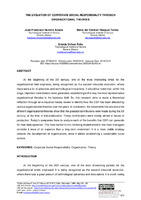| dc.rights.license | Licencia de Creative Commons Reconocimiento-NoComercial-CompartirIgual 4.0 Internacional (CC BY-NC-SA 4.0) | |
| dc.creator | Herrera Acosta, José Francisco | |
| dc.creator | Vásquez Torres, María del Carmen | |
| dc.creator | Ochoa Ávila, Eneida | |
| dc.date.accessioned | 2020-07-12T22:32:53Z | |
| dc.date.available | 2020-07-12T22:32:53Z | |
| dc.date.issued | 2020-07-01 | |
| dc.identifier.citation | Herrera Acosta, J. F., Vásquez Torres, M. C., y Ochoa Ávila, E. (2020). The evolution of corporate social responsibility through organizational theories. Visión de Futuro, Revista Científica. Posadas (Misiones): UNaM. FCE. PPA; 24(2), 105-124. | |
| dc.identifier.issn | 1668-8708 | |
| dc.identifier.other | VF-050 | |
| dc.identifier.uri | https://hdl.handle.net/20.500.12219/2526 | |
| dc.identifier.uri | https://doi.org/10.36995/j.visiondefuturo.2020.24.02.003.en | |
| dc.identifier.uri | https://visiondefuturo.fce.unam.edu.ar/index.php/visiondefuturo/article/view/392/296 | |
| dc.description | Fil: Herrera Acosta, José Francisco. Technological Institute of Sonora; Mexico. | en |
| dc.description | Fil: Vásquez Torres, María del Carmen. Technological Institute of Sonora; Mexico. | en |
| dc.description | Fil: Ochoa Ávila, Eneida. Technological Institute of Sonora; Mexico. | en |
| dc.description.abstract | At the beginning of the XX century, one of the most interesting times for the organizational field originates, being recognized as the second industrial revolution, where there were a lot of advances and technological innovations. It should be noted that, within this stage, important contributions were generated, establishing in this way the most representative organizational theories in the business field. So, this research aims to make a theoretical reflection through an exhaustive literary review to identify how the CSR has been affected by various organizational theories over the years. In conclusion, the documents that are about the different organizational theories show that the greatest contributions were made during the XX century, at the time of industrialization. These contributions were mostly aimed at issues of production. Today's companies have to analyze each of the benefits that CSR can generate for their daily operation. The main barrier to this not being implemented is that most managers consider it more of an expense than a long-term investment. It is a more viable strategy towards the development of organizations, since it allows establishing a sustainable future outlook. | en |
| dc.format | application/pdf | |
| dc.language.iso | eng | en |
| dc.publisher | Universidad Nacional de Misiones. Facultad de Ciencias Económicas. Programa de Posgrado en Administración | es_AR |
| dc.rights.uri | http://creativecommons.org/licenses/by-nc-sa/4.0/ | |
| dc.source | Visión de Futuro (Misiones), 7-2020; 24(2): pp. 105-124 https://visiondefuturo.fce.unam.edu.ar/index.php/visiondefuturo/index | |
| dc.subject | Corporate social responsibility | en |
| dc.subject | Organization | en |
| dc.subject | Theory | en |
| dc.title | The evolution of corporate social responsibility through organizational theories | en |
| dc.type | info:eu-repo/semantics/article | |
| dc.type | info:ar-repo/semantics/artículo | |
| dc.type | info:eu-repo/semantics/publishedVersion | |




